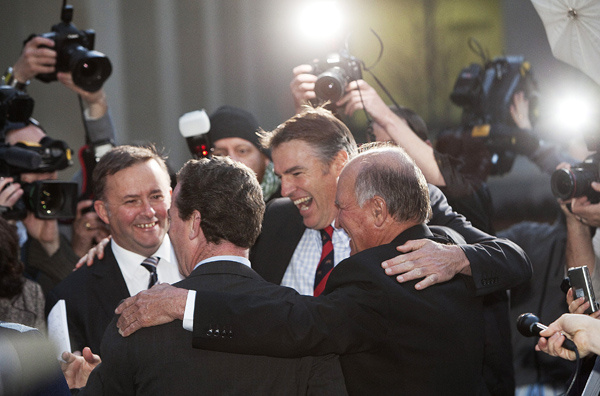Australian Labor party will continue in office
Australia's Aug. 21 general election has resulted a first hung parliament in 70 years. Two weeks after the election, the two main parties are still negotiating with the independents to form a minority government.
 |
|
Independents Rob Oakeshott (2nd R) and Tony Windsor (R) celebrate with senior government minister Anthony Albanese (L) and senior opposition member Chris Pyne (2nd L) after an agreement, which will give independents a greater role in the new parliament, was reached in Canberra September 6, 2010. Australian Labor Prime Minister Julia Gillard will know on Tuesday if she can form a new minority government with the support of three independents, ending more than two weeks of uncertainty after the August 21 elections. [Xinhua] |
Up to now, newly elected Greens' Member of Parliament (MP) Adam Bandy, and independent MP Andrew Wilkie has declared support to the Labor party providing Prime Minister Julia Gillard with 74 seats in the 150-member lower house of parliament. A total of at least 76 seats is needed for either party to form a government on their own.
The opposition coalition has 73 seats, but it could still win the race to form a government if the three remaining independents line up behind its leader, Tony Abbott.
The three independents are widely expected to announce their decision on Tuesday morning.
"If I was pushed I'd say that the government will continue that is (Labor leader) Julia Gillard will continue in office," Professor John Warhurst, from the school of Political Science and International Relations at the Australian National University, told Xinhua in an exclusive interview.
"It's very very evenly balanced at the moment but from what we know of the private discussions that have become public, and the public comment by the independents that perhaps a 50/50 balance is shifting slightly in favor of the Labor party continuing in office at the moment."
 0
0 






